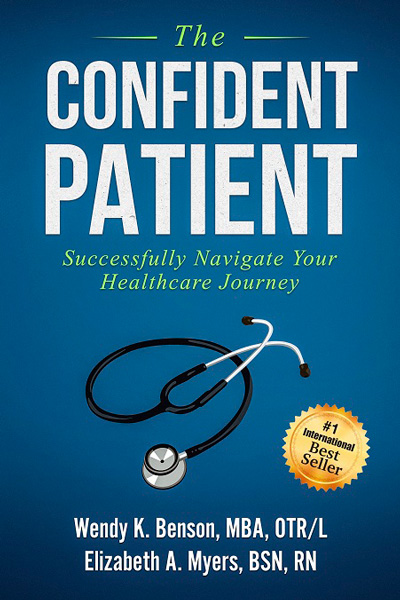The following is an excerpt from the book “The Confident Patient: Successfully Navigate Your Healthcare Journey” by Chicagoans Wendy K. Benson, MBA, OTR/L, and Elizabeth A. Myers, BSN, RN.
“As a nurse, I saw patients who were extremely overwhelmed with managing their experience — the role of medical personnel, who said what, which medications to take and when … it all adds up. This is compounded by health complications, insurance coverage, confusing medical terms — it’s no wonder anxiety builds,” Myers says. “Our goal is to share our experiences with patients and their families, so they find comfort in knowing they are not alone, and they are empowered to take control of their own healthcare journey.”
“The Confident Patient” includes helpful tips and resources like a list of questions to bring with you to appointments, what to do before surgery, what to consider for follow-up appointments, and this list of things your medical team wants you to know. To read the full chapter, purchase a copy of “The Confident Patient” on barnesandnoble.com or Amazon.
Betty was 69 years old and feeling very apprehensive about her upcoming knee replacement surgery when we met her. Betty lived independently prior to the surgery and hoped to continue to do so after her full recovery. Prior to her surgery however, Betty was feeling quite anxious and had several concerns about how she would be able to manage her daily needs immediately following her procedure. Betty talked candidly with her physician about her questions and reservations. Her physician shared with us that, especially since Betty lived alone, she really appreciated Betty’s specific questions about what to expect in the first couple of weeks after her surgery. Betty asked for details regarding typical implications for her mobility, function, pain control, and the amount of assistance she might need with her wound care and dressing as well as using the bathroom and showering. Although she had some limited family support, Betty was able to proactively plan additional professional nursing assistance after more fully understanding and anticipating what her needs would likely be during the first stages of her recovery process. Because she had an open discussion with her medical team in advance of her surgery, Betty was able to feel confident in her proactive planning for additional assistance in the first weeks of her recovery.
 We have had the good fortune to work for and with many organizations and collaborated with countless talented and compassionate medical professionals. We truly feel honored to partner with them. People choose working in the healthcare field because they genuinely care deeply about the health and well-being of their patients, about connecting with their patients’ families and loved ones, and about educating their peers and medical professional students entering the healthcare field. When we posed the question to our colleagues, “What do you wish your patients knew?” and did research on what medical professionals have communicated regarding this question, the overwhelming response was one of instilling knowledge. And what better way to learn more about your own or your loved one’s health condition than by having an open dialogue with your medical professional? Candid discussions about current health status, diagnosis, options, and recommended treatment plans are extremely important. In this chapter we quote, summarize, and distill recommendations from medical professionals in our community as well as those across the world.
We have had the good fortune to work for and with many organizations and collaborated with countless talented and compassionate medical professionals. We truly feel honored to partner with them. People choose working in the healthcare field because they genuinely care deeply about the health and well-being of their patients, about connecting with their patients’ families and loved ones, and about educating their peers and medical professional students entering the healthcare field. When we posed the question to our colleagues, “What do you wish your patients knew?” and did research on what medical professionals have communicated regarding this question, the overwhelming response was one of instilling knowledge. And what better way to learn more about your own or your loved one’s health condition than by having an open dialogue with your medical professional? Candid discussions about current health status, diagnosis, options, and recommended treatment plans are extremely important. In this chapter we quote, summarize, and distill recommendations from medical professionals in our community as well as those across the world.
1. Curiosity is encouraged.
Ask questions; it can truly help you stay healthy or enhance your health.
2. Bring someone with you to appointments.
This person can be the note taker, help by reminding you of the questions you discussed in advance, or assist by recalling information that was discussed after the appointment is over.
3. Be honest about what is going on with you.
Your medical team wants to help you and can do that to the best of their abilities if they have a complete understanding of your current situation.
4. Physical activity is healthy for our bodies.
Physical movement is helpful to keep us healthy or to get us even healthier.
5. Mental activity is beneficial for our minds.
Experts agree, the more we use our brains, the better our cognitive functions are over time.
6. Plan ahead for your healthcare “after” situation.
Talk through with your medical team typical recovery times/status and you can proactively prepare for support and assistance in advance.
7. High quality healthcare providers want what is best for their patients, including getting second opinions when appropriate.
8. Trust yourself and your gut.
You know yourself best and be sure to communicate what is working well for you and what your concerns are from a healthcare perspective.

